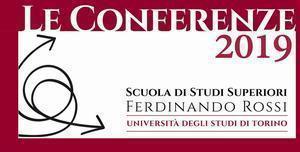18-19/3 Ethics and Hope. Risks and Chances in the Digital Era

Scuola di Studi Superiori Ferdinando Rossi
Collegio Carlo Alberto
18 - 19 March 2019
Università di Torino | Campus Luigi Einaudi, Lungo Dora Siena 100
Ethics and Hope
Risks and Chances in the Digital Era
aula E4 | Monday 18 March - h 17:00
Business Ethics for the Digital Era
prof. Christoph Lütge, Technische Universität, München
Digital technologies, like AI, the internet of things, autonomous cars or smart grids, are more than merely technical innovations. In the decades to come, they will shape societies and the lives of billions of people across the globe in a hitherto unseen way. They will raise ethical questions related to innovation in many new ways. Prof. Lütge will give an overview of the ethical risks and chances associated with these technologies and discuss consequences for governance, business and civil society.
aula B1 | Tuesday 19 March - h 10:00
Technologies of Hope
prof. Luciano Floridi, Oxford Internet Institute, University of Oxford
In 1 Corinthians 13:13, St. Paul famously wrote about the importance of faith, hope and love. In this talk, I will concentrate on hope, its logic, and how digital technology may be either a hindrance or an opportunity for its development. Most studies of human behaviour, in particular economic ones,assume that self-interest is the main engine of human behaviour. However, human behaviour is driven by at least two engines, the other one being hope. And hope is more powerful. People may do things on the basis of the highest degree of hope,which may actually overcome any self-interest driveincluding sacrificing their lives (thus the highest degree of self-interestis still insufficient to overcome the highest degree of hope).
Digital technology relies less on self-interest and much more on hope to market itself as the ultimate,desirable solution. The hope of higher productivity, easier interactions, faster connections, better products… the rhetoric changes but the fundamental promise is that a new digital technology will be better than an old technology in fulfilling more promises.
In this talk, I will explore this phenomenon in order to discuss a risk and an opportunity. The risk is that digital techno-hope may manipulate and exploit people, replace any other kind of hope (e.g. in some forms of transhumanism or posthumanism), including more spiritual ones, and end up supporting a view of any problem as either solvable technologically (e.g. by design) or unsolvable tout court (techno-solvism).
The opportunity is that the emphasis on hope may counterbalance the economic overemphasis on self-interest, show that properly informed hope is a better engine of human behaviour, and help us to develop an education of hope that is environmentally sustainable, humanly preferable, and ultimately tolerant, if not friendly, towards a more spiritual understanding of human life.
Luciano Floridi1,2
1Oxford Internet Institute, University of Oxford, 1 St Giles, Oxford, OX1 3JS, United Kingdom;
2The Alan Turing Institute, 96 Euston Road, London, NW1 2DB, United Kingdom.
Corresponding email: luciano.floridi@oii.ox.ac.uk





